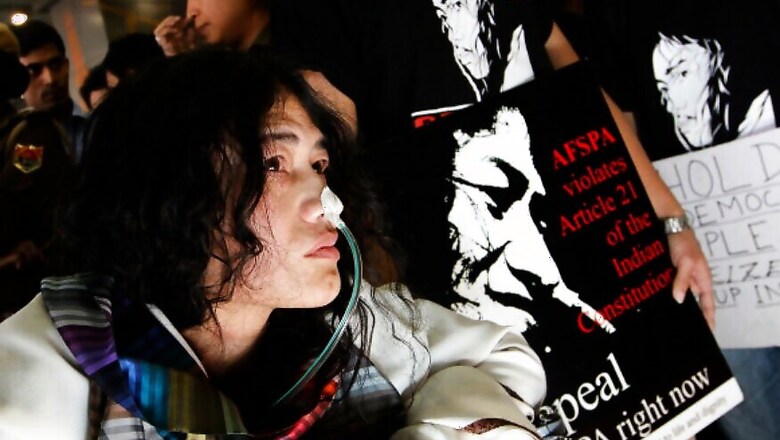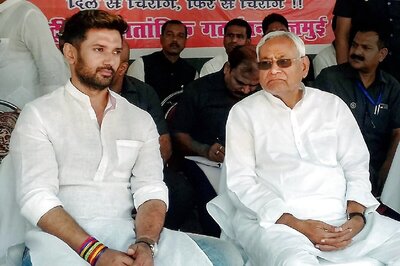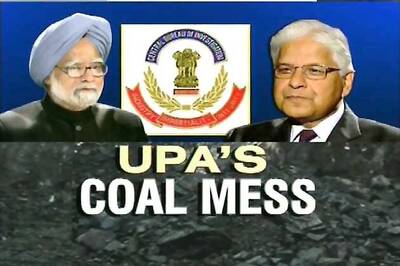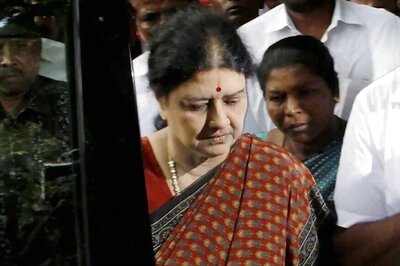
views
She started that fast alone, almost unnoticed, but soon became the face of an entire movement against the dreaded Armed Forces Special Powers Act (AFSPA).
Nearly six years later, just as abruptly as the way she started it , she took the decision to end her fast. Core members of her team, the civil society of Imphal and journalists were all taken by surprise, probably that's how it was supposed to have been.
As Kishalay Bhatacharya, a senior journalist from the region, points out - in November 2000, after the Malom Massacre, where ten civilians were killed at a bus stop allegedly by Assam Rifles soldiers, she came home early one day.
Irom told her mother to serve her a meal, and after eating that she said this was going to be her last meal in sometime now. She then took a bus and reached Malom and vowed not to eat, drink, comb her hair or look at a mirror until AFSPA was repealed.
From there on, the protest grew in strength to a time when there were thousands of women on a relay hunger strike with her. She refused to be fed and the police took her in custody.
Worried that her death might make things go out of control, the state started force-feeding her in custody. A practice which continues to this very date.
16 years later when she decided to break her fast, it is difficult to imagine what she has been going through.
As Chitra Ahanthem, an Imphal-based journalist points out: "The standard greeting in Imphal when we meet someone is to ask, "Have you eaten?". Whenever Iche (Irom Sharmila) asked that, I squirmed with the guilt of knowing that her journey against AFSPA has been uniquely passionate and deeply personal.
After August 9, I will finally get to ask her "chaak chaarabra Iche?" (Have you eaten, Iche?)'.
But not everybody is happy with her decision. Irom Singhajit, elder brother of Irom Chanu Sharmila told Imphal Free Press that she is welcome to carry out any decision she makes.
"If she wants to end her fast, enter politics or even enter wedlock, it is her decision. As for my opinion on her decision to enter politics, I have no prior knowledge, and it was not discussed with me," he said.
But rued that this was not the decision that their mother desired. He goes on to blame Irom's fiance Desmond Coutinho, a British citizen of Goan origin, for this decison, even alleging that Coutinho could be an agent of Research and Analysis Wing (RAW), who was sent to divert the course of Sharmila’s movement.
( Link here : http://ifp.co.in/page/items/33416/sharmila-is-free-to-decide-on-her-course-of-action)
It is important to note that Irom's relationship with her brother worsened after 2011, when she first met Desmond Coutinho. A year before that ,Coutinho had written to her, impressed by reading about her. Soon the correspondences increased and love bloomed.
I first met Irom when she came to Delhi for her court appearances. She loved coming to Delhi, as it helped her propagate her thoughts to the world
at large. In all the 4-5 odd interviews I did with her, two things were very clear. One was her dedication to the cause for which she took this
enormous step and the second, her dislike at being made a symbol or deity. She would often say she is a normal human being who enjoys things that normal people do. A statement which exemplifies the supreme sacrifice.
But she had begun to realise that her movement was losing steam. Last year when she was released for those customary 48 hours, less than 100 people had gathered at her protest venue.
Probably somewhere she felt cheated. Here she was on a hunger strike for over 15 years, and on her release there were hardly any crowds to support her through this.
Babloo Loitongbam, one of Imphal's most respected Human Rights activist said she had been hinting about a change in strategy in her fight against AFSPA.
As she decides to contest election, this could be the next big game changer. She has now decided to become a law maker to repeal a law.
But it needs to be seen how this would play out in the socio-political sphere of Manipur.
The tectonic shift is unmistakable, but several questions loom large at this point.Would the civil society back her unequivocally in this fight? Would she be the only one contesting elections or would some of her supporters contest too? How would mainstream political parties react to this?
And last, but not the least, what would the various underground groups who latched on to her for moral support do now?




















Comments
0 comment